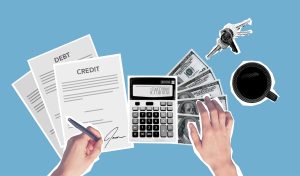Taking out loans has become a normal part of many people’s lives. Many apply for credit products to purchase big-ticket items such as a house and a car. In some instances, loans are intended for funding a business. Regardless of the purpose, loans are helpful options for those who experience financial struggles.
However, for some borrowers, managing debts can be challenging. The good thing is that many expert tips and tricks work with all types of borrowers. If you want to know these strategies, follow this guide until the end.
Look for opportunities to consolidate.
Debt consolidation is the process of combining two or multiple credits into one big chunk of credit product. This way, making monthly payments with one due date will be much easier. Plus, you can potentially enjoy lower interest rates. You can find plenty of debt consolidation online. Approval is much quicker with online lenders, so this would be helpful for those who want to take action immediately. Pick a credible loan provider, complete with the licenses and positive client feedback.
The most notable benefit here is the fixed repayment schedule, allowing you to work on the repayments efficiently since you won’t have to guess the minimum payments you must make monthly.
Keep track of how much you owe.
As a borrower, you must know how much you owe and to whom you owe that money. This way, you will clearly understand how much debt you have and dedicate a portion of your income to pay off that amount.
Some important details of debts you must keep track of are the different creditors you owe, monthly payments, interest rates, due dates, and the total amount of debts overall.
By keeping track of all these, you will see the bigger picture and ensure you are not going astray from your financial obligations, avoiding penalties and additional charges for late payments.
You may also use accounting software to keep track of the due dates and streamline all the repayments, ensuring you won’t miss any.
Pay bills promptly.
It is also essential to pay your bills as they come in. Missing any due date would make it much harder for you to pay the balance due to late payments and a potential increase in interest rates.
You may install a digitalized calendar in the gadget you use daily. Then, you may set up an alarm a few days before the due date and another one the day before. This would remind you of your financial obligations and the set payment schedule.
Other benefits of paying bills on time include reduced stress, better credit scores, and a chance to get lower interest rates in future loans.
Make the minimum payment.
For credit card holders, it’s essential to make the minimum payment every month. Making the minimum payment every billing cycle helps you avoid late payment fees and negative remarks on your credit report.
If you don’t make the minimum payments, you may suffer from the derogatory marks reflected in your credit report, which would remain for seven years. This could affect your future loan applications, making it hard for you to secure funding for future needs.
You may also try to pay more than the minimum whenever you can. This is because when you have a large balance on your credit card, the issuer will charge interest on your debt. As a result, you can accumulate a large amount of interest rate if you decide to make the minimum amount every billing cycle.
Prioritize debts with high interest rates.
If you have regularly taken out loans, you probably already know which debts to pay first. It would be wise to start with the highest interest rates. When you apply this strategy, you can save more on the interest rates. High-interest loans include credit cards and short-term loans like payday loans. If you have the likes of these credit products, make sure to position them on top of your list.
This strategy is called the Debt Avalanche Method. This involves making the minimum payment for all other types of loans and putting all the extra money to pay off the loan faster with the highest interest loan. Once you have ticked off the loan with the highest interest rates, proceed to the second-highest-interest loan using the same strategy. Repeat the process until no debts are left.
Check your credit report.
If you think you will need other types of loans in the future, it’s crucial to look after your credit report. Basically, your credit report contains all of the critical information that would be used in determining your credit score. However, you don’t have just one credit report.
Multiple credit reporting agencies keep track of your credit activities. So, keeping track of any errors, fraudulent activities, and negative entries that might be reflected in one of your credit reports is essential.
Your credit score may suffer if you don’t try to correct these errors. Remember that with a poor credit score, finding a loan with favorable terms and interest rates will be challenging.
Final Thoughts
These simple strategies work for all types of creditors with varying loan amounts, whether secured or unsecured. Putting all these into practice needs commitment. Stay focused on eliminating debts or, at least, the ones with the highest interest rates. With all these tips and tricks, you can manage your money efficiently without getting too stressed about your financial obligations to creditors.





